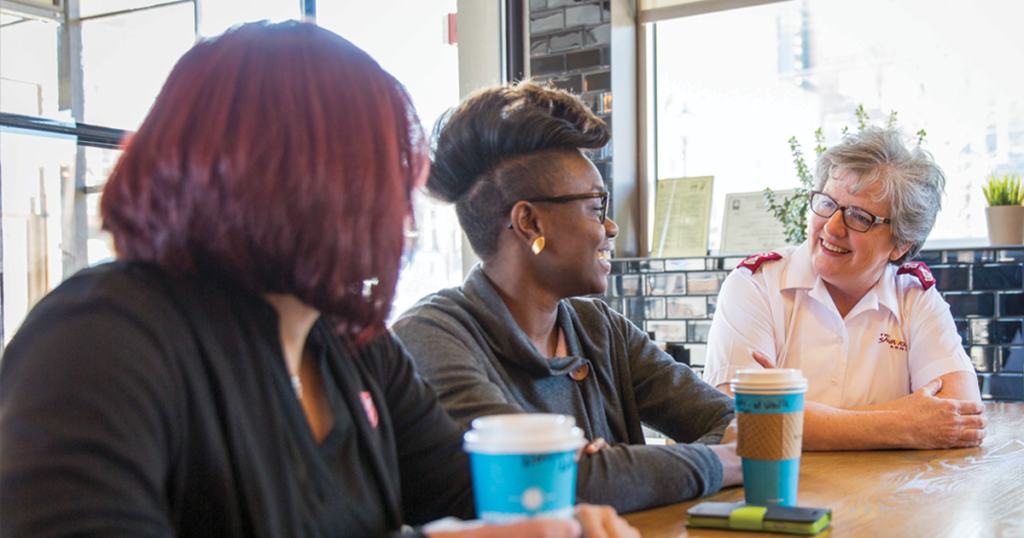Sharing Faith in a Secular World
Three Christian leaders discuss how Christians can share their faith in today’s climate of distrust and division.
The Fight for Good podcast recently interviewed three influential Christian leaders about how they share faith in an increasingly secular culture. This article contains excerpts from the interviews with Dr. Ed Stetzer, a professor and dean at Wheaton College and is a member of the executive committee for the National Association of Evangelicals; Russell Moore, editor in chief of Christianity Today magazine; and Nona Jones, chief content and partnership officer at YouVersion, author and co-leader of the Open Door Church community in Gainesville, FL.
What, in your experience, is the most powerful way that Christians can share the gospel these days?
Dr. Stetzer: Well, I think how they share the gospel or how they embody a gospel witness might come down to maybe how God has wired them. For me, I would say, first and foremost, the best way to encourage them to share the gospel is any way that they will actually share the gospel.
All of us have a responsibility to show and share the love of Jesus. Jesus gave the mission to all Christians. He said, “As the Father has sent me, even so send I you,” not [just] the pastors, not [just] the officers. There are all kinds of resources that train people. The challenge is people are often a little unsure or maybe afraid to share their faith. They can use those resources to strengthen that, but at the same time, I think, ultimately, it’s a hard issue. We’ve got to have the desire to show and share the love of Jesus.
There was a time when Christians only thought about proclaiming the gospel, just telling people about Jesus. Today, we live in a world where it’s harder to get people to tell people all about Jesus and it might be easier for them [to say], “Let’s do a serve day. Let’s do some demonstration of care and concern for our community.” Both of these really deeply matter and I think The Salvation Army has embodied that for well over a century.
I would say in the second decade of the second millennium, we’re also acknowledging that all across the world, people will welcome you when you do good deeds. Communities will welcome you if you are focused on gospel demonstration, but they will tend to resist you or oppose you when you focus on gospel proclamation.
I think we have to remember that this is not the mid-1800s when maybe the shocking news was that Christians should care for the poor. This is the time [where] the shocking news is Christians should proclaim the good news of the gospel, teach the totality of the scriptures in a world that’s not so appreciative about those things.
Again, let me say, too, that I’m deeply appreciative and want more, not less, [of] Christians serving the hurting, like in that Luke 4:18–20 picture: “The Spirit of the Lord is upon me. He has anointed me to preach good news.” When we join Him on mission, our mission needs to prioritize serving the hurting and saving the lost, as I know is so central to the mission of The Salvation Army.
What do you find resonates most with people?
Moore: I hear from people every day all day long who would say, “Well, I just can’t believe in anything supernatural.” They’re people who have seen institutions let them down and that’s thrown them into, “Are there institutions that I can trust at all?” So that seems to be the moment we find ourselves in right now.
The most popular part of “Christianity Today,” and has been, ever since CT started doing this, is the testimony at the back in which someone will tell the story of how it is that they came to be a follower of Jesus. And what’s really remarkable to me is that they’re inclusive of people who maybe grew up in the church, maybe they followed in the paths of their parents, or … people who never would be expected to be religious at all, or even to survive in terms of their own lives. These sorts of stories say to people, “It’s not too late for you. You’re not the kind of person who’s beyond the reach of grace and redemption.”
They’re very different from the kinds of stories that we like to tell culturally right now, which often have to do with strength and winning and displaying and success. These stories are about vulnerability. There’s a sense of recognizing God’s power in weakness and that life isn’t just about winning and that’s quite different from what we’re accustomed to.
There’s a reason why a great deal of what Jesus was teaching was in parables. It reaches a deeper part of the psyche than does a syllogism. And that’s one of the reasons why, to go back to testimony, when someone starts to tell his or her story, there’s usually a different sense of openness there, and then when that story is included in the story of Jesus, even more so.
I think one of the things is to really pay attention to the story that we tell at [Christmas] time, because there’s a way we can sanitize it and it becomes really familiar to us. But if we actually look at what the Christmas story is, it’s both good tidings of great joy, which shall be to all people and … the presence of great darkness. Herod is enraged. The holy family has to leave as refugees from a murderous dictator. All of these things are taking place and God is working with the least likely people: with shepherds, with stargazers from the East and with others. So, I think paying attention to that story can cause us to wonder who are the people around us who have become invisible to us and how do we start asking who those people are so that they can become visible and so that we can serve them.

Tell us a little bit about coming to the Lord.
Nona: I am a walking, talking, living, breathing statistical anomaly. I have experienced tremendous amounts of success in my career and have a wonderful family. But my origin story is not quite as kind. I grew up in a home where there was a lot of physical, sexual and verbal abuse. I’m an only child. My father passed away shortly before my second birthday. And my mom had a live-in boyfriend who became abusive to me at the age of five. My mother was not a person of faith and I did not grow up in a Christian household.
The abuse was so traumatizing that I actually tried to end my life at the ages of nine and 11, but shortly after my second suicide attempt in the sixth grade, my best friend invited me to church. I didn’t know what church was. I had no point of reference, so I just thought we were going to go over her house and play a game called “church.” But her mother came and picked me up that Sunday, and we went to the church thing.
And I remember when we pulled up into the parking lot, there was just this air of love. When I walked into the building, I immediately felt wanted. I felt like I belonged, which was something that I had never felt before. You know, my trauma as a child had led me to act out in school. So, I would often get sent to the principal’s office. I had been called all types of names and was told I had a learning disability. And then I walked into this church and people saw me and they loved me without even knowing me. Shortly after that, I got involved with the youth ministry and it was in that ministry that I accepted Jesus.
I began to find my identity and who God said I was, not the words that had been spoken over me—you’re fat, you’re ugly, you’re dumb, you’ll never be anything. Suddenly here I am confronted with the fact that my Creator, my Creator had fearfully and wonderfully made me, that He had a plan for me, that He set me apart before I was formed in the womb. That truth really shaped my understanding of my worth and my value and it changed my entire life. The abuse didn’t immediately end. But being in that church community, I had a place where I was safe. I had a place where I felt loved and I felt seen. I felt known and that made all the difference.
That’s why I have so much empathy for this generation. Because I think this generation is experiencing a very generalized trauma. That’s almost like the trauma of being. A lot of people look at this generation and they just think, “Oh, you know, all you care about is social media. You know, you’re not really doing anything with your life.” So, the very value that God placed in all of us is getting dismissed. I think it’s causing this generation to actually live down to people’s low expectations of them. I’ve been there, that’s frankly why I acted out in school—because the expectation of me was so low that I decided to live down to it.
You know, a lot of times we say things like, “What’s wrong with you? Why do you keep doing this?” That is the wrong question. The question is, “What happened to you? What happened to make you think that this was the best choice for your life?”
I look at His [Jesus’] example and I find it striking that He made a beeline for the marginalized, for the outcast, for the ones that were ushered to the margins of society. He saw them, He loved them and He welcomed them. I feel like being more like Jesus is not a derivative of knowing more doctrine and being more theologically astute. I think being more like Jesus is seeing the unseen. It’s loving the unloved. I just thank God for The Salvation Army and the fact that we’re not looking for the perfect person. We’re like Jesus. We’re looking for the person who’s in need.
Ed Stetzer is a Dean and Professor at Wheaton College and is a member of the Executive Committee for the National Association of Evangelicals.
Dr. Russell Moore is the editor-in-chief of Christianity Today and director of their Public Theology Project.
Nona Jones is the author of “Success from the Inside Out” and “From Social Media to Social Ministry.” She and her husband, pastor Timothy L. Jones Sr., are leaders at Open Door Ministries in Gainesville, FL.







